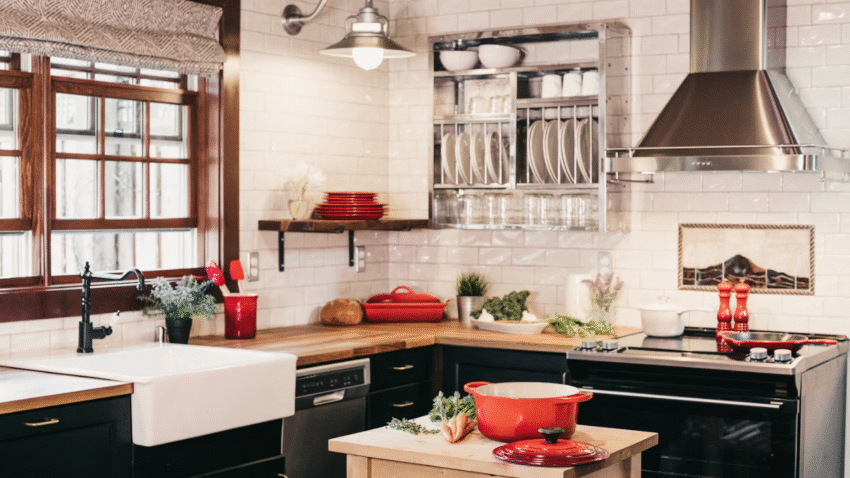Introduction
Struggling with stubborn smells lingering in your kitchen? Whether it’s last night’s fish dinner, burnt toast, or the trash bin’s mystery scent, knowing how to eliminate kitchen odors quickly is essential for a fresh and welcoming cooking space. In this guide, you’ll learn fast and effective methods to neutralize smells and prevent them from coming back—so your kitchen stays clean, safe, and enjoyable every day.
Why Eliminating Kitchen Odors Matters
Keeping your kitchen odor-free isn’t just about comfort—it’s essential for hygiene and cooking enjoyment. Strong smells can seep into soft surfaces like dish towels, curtains, and even your food. Lingering kitchen odors can also signal deeper problems like mold, spoiled food, or clogged drains. A fresh-smelling kitchen contributes to an inviting environment and ensures that your prep surface, utensils, and cooking workflow are not compromised by unpleasant distractions.
Eliminating odors quickly also helps preserve the integrity of your kitchen’s aesthetic. Guests notice the smell of your home the moment they walk in—and a clean scent signals care and attention. Plus, certain food odors can attract pests if not dealt with immediately.
Step-by-Step Guide to Eliminating Kitchen Odors Quickly
1. Identify the Source of the Smell
Before you can eliminate the odor, you need to know where it’s coming from. Check these common sources:
- Trash bin or compost bucket
- Refrigerator leftovers or spills
- Garbage disposal
- Greasy stovetops or oven buildup
- Dirty dish towels or sponges
Use your nose and do a quick inspection to track down the culprit.
2. Take Out the Trash Immediately
If your trash has food waste, meat packaging, or used paper towels, odors can build up fast. Tie up the bag and take it outside. Rinse the bin with hot water and disinfect with a vinegar or baking soda solution to neutralize remaining smells.
Kitchen Tip: Sprinkle baking soda at the bottom of your trash can before adding a new bag to absorb future odors.
3. Clean the Garbage Disposal
Food particles in the garbage disposal are a major cause of bad kitchen smells. To clean it:
- Run cold water while grinding a few ice cubes to loosen stuck food.
- Follow up by grinding citrus peels (lemon or orange) for a fresh scent.
- For a deeper clean, pour ½ cup of baking soda followed by 1 cup of vinegar. Let it fizz for 10 minutes, then rinse with hot water.
4. Boil an Odor Neutralizer
Simmer a pot of water with odor-fighting ingredients like:
- Lemon slices and rosemary
- Vinegar and cinnamon
- Baking soda and essential oil (just a few drops)
Let it simmer for 15–30 minutes. This not only eliminates smells but adds a pleasant aroma to the room.
5. Use a Natural Air Freshener
Create a DIY air freshener by mixing water, vinegar, and a few drops of essential oil in a spray bottle. Mist the air lightly to refresh your kitchen without harsh chemicals.
Warning: Avoid using synthetic sprays over food prep areas—they may leave unwanted residues.
6. Refresh the Refrigerator
Fridge smells can sneak up on you. Toss expired food, wipe shelves with a vinegar-water mix, and place an open box of baking soda inside to absorb ongoing odors.
7. Deep Clean Soft Materials
Odors cling to fabrics. Wash kitchen towels, curtains, aprons, and seat cushions regularly. For extra odor removal, add a cup of white vinegar to your laundry cycle.
8. Improve Airflow
Open windows and doors to let fresh air in. If you have a range hood, turn it on while cooking. You can also place a small fan to help circulate air out of the kitchen.
Common Mistakes to Avoid
Mistake 1: Masking Instead of Neutralizing
Spraying air fresheners over the smell only hides it temporarily.
Solution: Focus on removing the source and using natural deodorizers like vinegar, baking soda, or boiling citrus.
Mistake 2: Ignoring the Sink Drain
Many people forget the kitchen sink drain can hold odor-causing grime.
Solution: Clean your drain weekly with baking soda and vinegar followed by boiling water.
Mistake 3: Letting Food Sit Too Long
Leaving dishes, food scraps, or leftovers out invites odor buildup.
Solution: Clear counters, wash dishes promptly, and store leftovers in sealed containers.
Mistake 4: Overlooking the Microwave
Microwaves can trap odors from heated meals.
Solution: Steam-clean by heating a bowl of water with lemon slices, then wipe down the interior.
Mistake 5: Reusing Dirty Sponges
A smelly sponge can transfer odors to every surface.
Solution: Sanitize sponges daily by microwaving them damp for 1 minute or switch to washable cloths.
Extra Tips & Kitchen Hacks
Use Coffee Grounds as a Deodorizer
Place used coffee grounds in a bowl and leave them on the counter or inside the fridge overnight. They absorb odors and leave behind a neutral scent.
Try Charcoal Bags
Activated charcoal naturally absorbs smells. Use small mesh bags around the kitchen or inside cabinets.
Deodorize Cutting Boards
Sprinkle coarse salt and scrub with half a lemon to remove lingering food smells and sanitize wooden cutting boards.
Related Task: After eliminating odors, consider organizing your kitchen pantry or deep-cleaning your oven to maintain a fresh environment.
Conclusion
Kitchen odors don’t have to linger. By identifying the source and using these quick, natural methods, you can keep your kitchen smelling clean and inviting every day. Focus on prevention—regular cleaning routines and good airflow are your best defenses.
One last tip? Keep a lemon or vinegar spray bottle under the sink for instant odor-fighting power. Bookmark this guide to make kitchen freshness a breeze.
